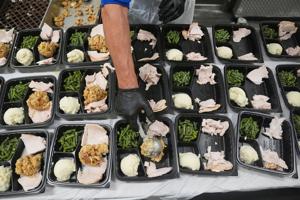Two federal judges have mandated that the Trump administration must utilize emergency reserve funds to continue financing the Supplemental Nutrition Assistance Program (SNAP) amid the ongoing government shutdown. The rulings, issued on November 1, 2023, from judges in Massachusetts and Rhode Island, compel the administration to determine whether to fund the program fully or partially for the month of November.
The U.S. Department of Agriculture (USDA) had intended to suspend SNAP payments starting November 1, citing an inability to sustain funding during the shutdown. SNAP, which supports approximately 41 million Americans—roughly one in eight citizens—serves as a crucial part of the nation’s social safety net, costing about $8 billion monthly.
U.S. Senator Amy Klobuchar, a Minnesota Democrat and ranking member of the Senate Agriculture Committee, noted that the judges’ decisions reinforce the view that the administration is neglecting its legal responsibility to provide assistance to those in need. She stated, “The administration is choosing not to feed Americans in need, despite knowing that it is legally required to do so.”
Judicial Decisions Affirm Legal Obligations
The rulings stemmed from a legal challenge initiated by Democratic state attorneys general and governors from 25 states, along with the District of Columbia. They argued that the Trump administration has a legal obligation to maintain SNAP funding in their jurisdictions. The administration had previously claimed it could not tap into a contingency fund of approximately $5 billion for SNAP, reversing an earlier USDA position that suggested these funds could be accessed.
In Providence, U.S. District Judge John J. McConnell ruled that at least some emergency reserve funding must be allocated to SNAP, demanding an update from the government by the following Monday. Concurrently, Judge Indira Talwani in Boston deemed the USDA’s suspension of SNAP payments as “unlawful” and ordered the government to clarify its funding intentions for November.
“Defendants’ suspension of SNAP payments was based on the erroneous conclusion that the Contingency Funds could not be used to ensure continuation of SNAP payments,” Judge Talwani stated, emphasizing that these funds must be utilized as necessary for the program.
Impact on Beneficiaries and Food Aid Programs
Despite these judicial rulings, beneficiaries face delays in receiving their SNAP benefits for November. The process of loading funds onto SNAP debit cards can take over a week in many states, which means that many individuals will not receive timely assistance.
The administration has not yet indicated whether it will appeal the judges’ decisions. Meanwhile, states, food banks, and SNAP recipients are preparing for changes in how low-income individuals can access groceries. Advocates warn that halting food assistance would force many families to choose between purchasing food and paying other essential bills.
Diane Yentel, president and CEO of the National Council of Nonprofits, one of the plaintiffs in the Rhode Island case, expressed relief at the rulings, stating, “Thousands of nonprofit food banks, pantries, and other organizations across the country can avoid the impossible burden that would have resulted if SNAP benefits had been halted.”
Concerns regarding potential reductions in benefits linger. For instance, Cynthia Kirkhart, CEO of the Facing Hunger Food Bank in Huntington, West Virginia, noted that her organization will maintain extended hours, aware that many families will not see their benefits arrive as usual.
Individuals like Kristle Johnson, a nursing student and mother from Florida, voice apprehension about the impact of reduced benefits on their families. Johnson remarked on the struggles of ensuring her family has enough to eat, despite her efforts to budget effectively. “Now I have to deal with someone who wants to get rid of everything I have to keep my family afloat until I can better myself,” she said, referring to President Trump.
As discussions about SNAP continue, Agriculture Secretary Brooke Rollins criticized Democrats for what she described as a “disgusting dereliction of duty” in failing to end a Senate filibuster that has delayed funding extensions for healthcare and food programs.
According to the USDA, to qualify for SNAP in 2025, a family of four must have a net income that does not exceed approximately $31,000 per year. Last year, SNAP provided assistance to nearly two-thirds of its recipients, who were families with children.
The court’s ruling serves to protect millions of families, seniors, and veterans from being caught in the crossfire of political disputes. Skye Perryman, president and CEO of Democracy Forward, stated, “The court’s ruling protects millions of families, seniors, and veterans from being used as leverage in a political fight and upholds the principle that no one in America should go hungry.”
The situation remains fluid, and beneficiaries will be closely monitoring developments as the administration navigates its responsibilities during the shutdown.






